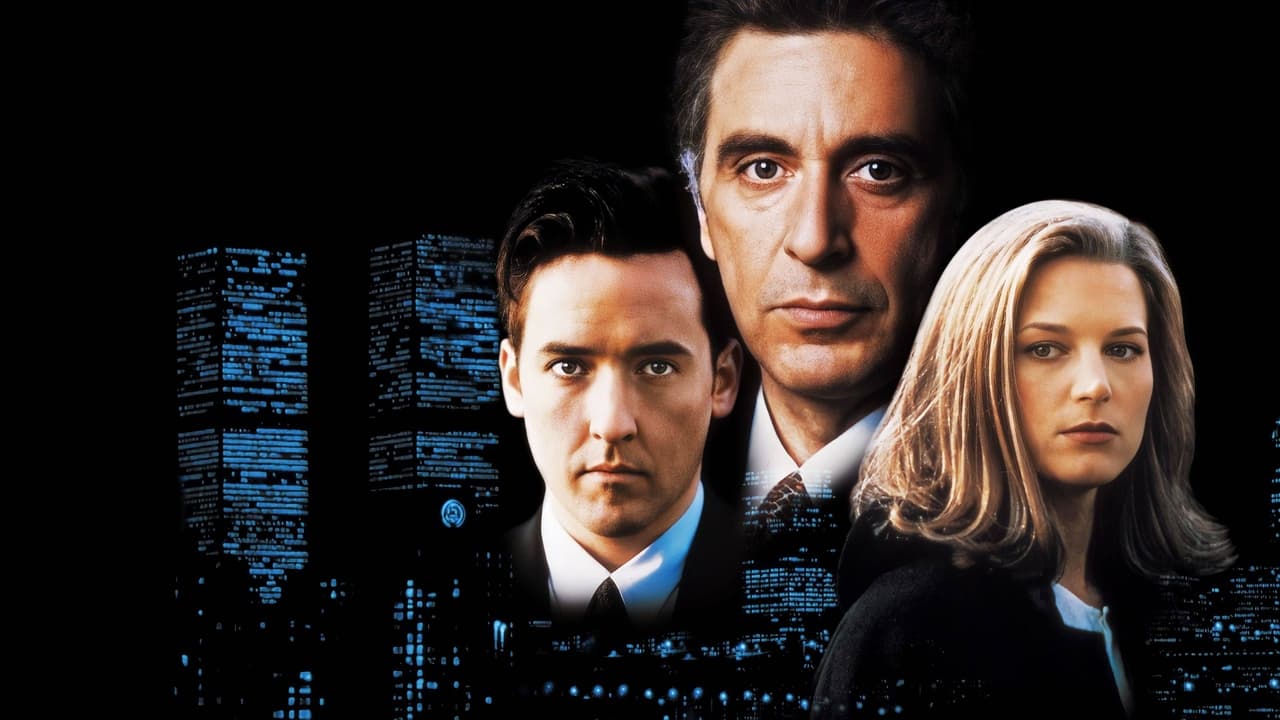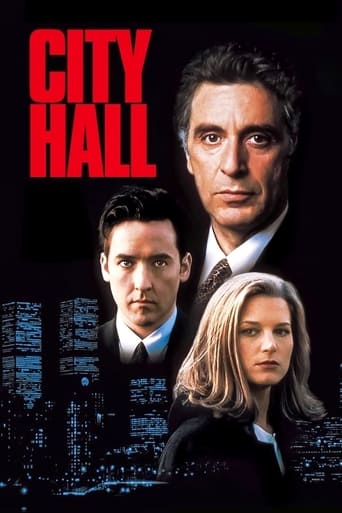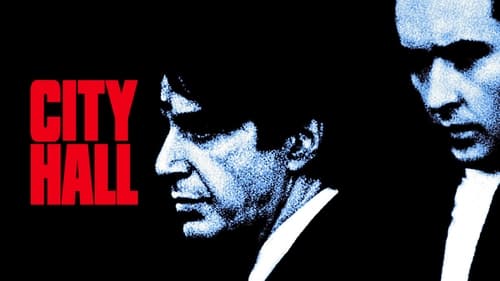



Waste of time
Really Surprised!
People are voting emotionally.
Far from Perfect, Far from Terrible
This film did not do well at the box office, probably because the drama is mostly in the dialog. There are a few tense moments, but most of the suspense and tension in the film come from Pacino's dynamic personality and Cusack's charm. Which is not to say the film is without merit. As a political thriller, it is probably more accurate in the way events are handled than most. You see the people in the mix, you see the steps that have to be taken, and you see the politics involved. Pacino's soliloquy at the funeral of the murdered child is nothing short of incredible, but soliloquy is what Al does best. Splendid performances by Aiello, Landau, Paymer, and Schiff fill out the plot with color and flair, and almost make up for the lackluster Fonda and the much too stereotypical Franciosa. Not at the top of my list, but definitely not at the bottom. Collectible if you are a lover of Pacino or Cusack, rated R for language and violence.
View MoreWorking from a script written in part by Nicholas Pileggi, best known for writing the book Wiseguy, which he adapted into the movie Goodfellas, and for writing the book and screenplay Casino, director Harold Becker shows how connected circles scratch each other's backs, even in the command of a comparatively honorable mayor like Pappas, who is regarded as a presidential prospect. As Cusack follows the paper trail of the dead mobster's probation report, his skepticism is agitated. How did this violent young man get probation rather than a jail sentence? We meet the other players in the plot, not the least of which is Danny Aiello, the political boss of Brooklyn, and Tony Franciosa, the Mafia boss whose nephew was shot dead. How and why these people are affiliated I leave to the movie to divulge, though there are never any misgivings that they are.The narrative is told generally through the eyes of the Cusack character, a visionary from Louisiana who admires his boss and hopes to learn from him. Much is made by everyone of bureaucratic knowledge passed down through the generations. Some of the dialogue is ungracefully erudite, but considering I just described the building blocks of the story as bureaucratic knowledge, one can't say it doesn't work. The shooting case builds against the seasoning of two other issues on the mayor's desk: a charge by Aiello for a subway stop and an off-ramp in Brooklyn to aid a new banking center, and the city's bid for the next Democratic convention. Individual idiosyncrasies are also explored, including Aiello's emotional bond with the music of Rogers and Hammerstein.Much also is made of menschkeit, a Yiddish expression, which, Pappas explains to his deputy, is about the bond of honor between two men, about what happens between the two hands in a handshake. This connection doesn't mean much to Bridget Fonda, the lawyer for the policeman's association who defends the dead cop's honor and fights for his widow's pension even as incriminating evidence appears. Little by little, the deputy mayor comes to grasp that menschkeit is such an influential notion that it outclasses he law.There are various scenes of hard impact, including one where the Brooklyn boss comes home for lunch in the middle of the day, his wife asserts her interest through the medium of the dish she has cooked, and then the Mafia boss drops in by surprise. There is also a compelling, and markedly conjectural, late scene between the mayor and his deputy.One scene handled with delicacy is comprised of the mayor's decision to speak at the funeral of the slain child, in a Harlem church. His advisers tell him he won't be wanted there. But he goes anyway, and cranks himself up for a spiel of unabashed hyperbole, Pacino and his character both.It gets an impressive reaction from the congregation, but the mayor knows, and his deputy knows, that it was artificial, and the way they scrupulously evade discussing it, in the limousine taking them away, is a subtle employment of composure and innuendo. This is a script that knows it has to supply Pacino with the reason why most of his fans go to see him, and immediately follows its quota with the reality that silence has much more inherent meaning than speech.Pacino and Cusack are convincing together throughout the movie, the older man unbreakable and aware, the younger one anxious to learn, but with ideals that don't sway. Pacino is innate with his down-to-earth capacity to marry common sense and inventive imagination, inspired flair and matter-of-fact realism. Cusack moves very freely in spite of his dark defensiveness.The Bridget Fonda subplot development is unnecessary, but it is a result of veteran screenwriter Paul Schrader's otherwise shrewdly perceptive belief in the worth of every character, and each is fleshed into earnest embodiments. Aiello, for instance, is a highlight because he evokes his character's joie de vivre and sensitivity to his environment.
View MoreAcross the country and especially in the political landscape, people with any kind of political ambition, should take time out to see this film. The movie is called " City Hall " and with little imagination, its synopsis can take place anywhere in America. It just so happens to open in New York. Here we have the story of a popular politician named Mayor John Pappas (Al Pacino) with enough savvy to run a major metropolitan city with very little effort. His right-hand man is none other than Deputy Mayor Kevin Calhoun (John Cusack) an equally bright individual who's ambitions are tied to his mentor and both seemed destined for higher office. Everything points in that direction, until a police shooting ignites an investigation spearheaded by Marybeth Cogan (Bridget Fonda) who believes the guilt points towards city hall and the mayor. A six year old boy and a police officer's death are blamed on a career criminal who's questionable freedom leads to an apparent cover-up by political pay-offs and city corruption involving union leaders like Danny Aiello played by Frank Anselmo, corrupt judicial officials like Judge Walter Stern. (Martin Landau) and mafia bosses like Paul Zapatti (Anthony Franciosa) who are deeply involved. Also implicated, are party officials like Larry Schwartz (Richard Schiff) who works for the probation office of New York. But it is the bond between the mayor and his deputy which is taken to task by the accidental shooting. A great vehicle for Cusack and a sure bet nominee to become a classic. ****
View MoreThe film concerns a classic theme. In fact it concerns the theme exploited by Batman, from beginning to end, but in real data and details. The mayor of New York, appreciated and very diligent and dynamic, in order to get some project through slightly faster than normal, yields to some pressure from some private business contractors about a criminal drug dealer who should have been sent and kept in prison and he pressurizes the judge in his turn to set him free on probation in spite of a negative probation report that disappears but is not destroyed, be it only because of the political value it represents. And what was to happen happens and a few people, including a black schoolboy is killed in a shoot out between a police detective and that criminal. The city may explode because of it: racial tension because of the black school boy and social tension because of the insecurity such criminals free to roam around and go on with their criminal activities represent to the public. Unluckily the film does not show that tension very well and follows the investigation of the first deputy mayor who wants to find out the truth and does find it out. But along the way a few witnesses are killed, and those who had played some role in the whole business are forced to retire (the judge), to end their career and life (the contractor or the contractor's go between), a public officer who was ready to deliver the disappeared probation report, and some shady character after he provides some crucial information. The mayor himself retires and takes a long vacation; But the main interest of the film is in the exploration of the contortions the mayor is doing to cover up the problem and the contortions he remembers having done in the past that led to the mistake about this probation case. The political philosophy that nothing is pure white or pure black and that everything is grey which is never comfortable to decision makers is invoked as an excuse for wrong but profitable decisions. We are not speaking of necessary compromises to get to some consensus in some domains that are crucial to public interest. We are speaking of considering as less important to take a bad decision about some petty or supposedly petty criminal than some infrastructure or economic project in the city. That is not typical of New York. That is true in any mayoral office. It is just more significant in quantity and in quality in a big metropolitan area like New York and of course in a city or country where police departments are municipal and are controlled by political imperatives. The young deputy mayor is thus pushing the old mayor out of the way, and he derails his ambition to be the governor of New York in order to become the president of the US. The mayor is perfect due to the embodiment Al Pacino offers us since he is able to express ten minutes of dialogue with one facial expression that makes the whole dialogue useless. I find the end slightly mushy with the ex-deputy mayor campaigning in his own name. That seems to mean that he was so attached to justice because he saw his chance to push the mayor out of his own way. Hence he is not better than all the others, just still too young in his ambition.Dr Jacques COULARDEAU, University Paris Dauphine, University Paris 1 Pantheon Sorbonne & University Versailles Saint Quentin en Yvelines
View More